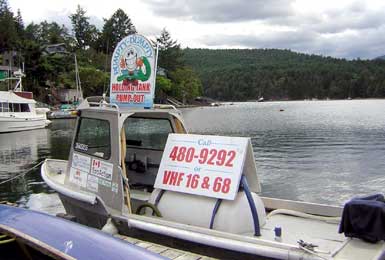by Sarah Verstegen
from Strait Talk, Summer 2004
In mid May I received the first call of the season for a holding tank pump-out by Pumpty Dumpty, the pump-out boat serving Saanich Inlet. Since I was on my way out of town, heading to Ladysmith for GSA’s annual general meeting, I forwarded the request.
 The volunteer crew from Saanich Inlet Protection Society rallied for the weekend call. One of the intrepid Pumpty Dumpty volunteers has “arms of steel.” After pumping the holding tank successfully, he pulled the cord on the gas-powered pump used to transfer the “honey” in Pumpty’s reservoir into the Brentwood sewer system hook-up at the ferry terminal. The cord broke. The following weekend found another volunteer at the marina, working on pump repair. As he worked, the neighboring boat’s bilge pump turned on frequently and as a result, the water was covered in the rainbow sheen of oil.
The volunteer crew from Saanich Inlet Protection Society rallied for the weekend call. One of the intrepid Pumpty Dumpty volunteers has “arms of steel.” After pumping the holding tank successfully, he pulled the cord on the gas-powered pump used to transfer the “honey” in Pumpty’s reservoir into the Brentwood sewer system hook-up at the ferry terminal. The cord broke. The following weekend found another volunteer at the marina, working on pump repair. As he worked, the neighboring boat’s bilge pump turned on frequently and as a result, the water was covered in the rainbow sheen of oil.
This dilemma presents itself frequently. The owner is not aboard. The amount seems small. Boaters and marina staff are reluctant to make official complaints. Most people prefer to save their calls to Coast Guard for the bigger events like a boat sinking. Yet the small spills matter, because they add up, are often chronic and end up in a sensitive zone. Half a litre of oil can cover an entire acre of surface water.
Surface water pollution makes life particularly difficult for marine life. Many fish depend on surface insects for food. A myriad of creatures that live on pilings, exposed as the tide drops, are coated in oil. Herring spawn can die when it has been deposited on marine plants that are exposed to oil. The old trick of using dish soap to make the sheen disappear only makes it worse, as it adds surfactants to the mix, which attach to the gills of fish and destroy their ability to breathe.
Fortunately, most of this is easily preventable. Absorbent pads that soak up fuel and engine oil are a simple way to keep hydrocarbons out of the marine environment. Make sure you keep one under your engine all the time to catchany drips, and make use of them at oil-changing time.
Another approach is to install a bilge water/oil separator between your bilge pump and the overboard discharge port. This does the opposite of the more common fuel/water separators between the fuel tank and engine: it filters out the oil, allowing the bilge water to keep going along the line, rather than capturing and holding back the water from fuel on its way to your engine. GSA’s executive director has ordered one for her converted fish boat, as she finds that 75+ years of accumulated bilge hydrocarbons goes beyond the capacity of absorbent pads. In our next newsletter she’ll be able to report back on the performance of a Vetus den Auden Bilge Water/Oil Separator, which is available from Budget Marine in New Westminster for about $150. Let us know if you have experience with bilge water/oil separators or other gadgets, so that we can share this info on our website and spare others any tribulations you experienced.
Meanwhile, the volunteer who fixed the pump aboard Pumpty Dumpty has asked Burrard Clean if they can provide absorbent pads for Pumpty’s crew to hand out. It’s pretty clear that people need to be gently led into changing their habits. Making services like pump-out and absorbent pads free of charge eases people into new habits. We still need regulation and enforcement to set boundaries, but the transition into a new etiquette requires motivators to get us out of old habits.
That brings up another dilemma: how to pay for the necessary education and free services that ease these changes in tight economic times? We’re grateful to VanCity Credit Union, which recently contributed $10,000 toward GSA’s Green Boating Program. We’re also happy to report that the Greater Victoria Harbour Authority will partner with us on a project to provide absorbent bilge pads to all its moorage customers.
I am continually amazed and grateful for the contributions of time that people provide. Our proposal to the Harbour Authority was spurred by a woman who asked about the brown sludge in the Inner Harbour (old diesel fuel). Our proposal to VanCity was strengthened by several people who, on short notice, provided support letters from their organizations to show that the community really does value the work we do. I find it ironic that saving the marine environment in our era of global warming sometimes comes down to driving across town to deliver a letter on deadline.
When you’re boating this summer, you’ll likely fi nd good opportunities to reduce greenhouse gases and take other steps to save the environment. If you own an outboard powered boat, consider switching over to a 4-stroke engine. Check out the Guide to Green Boating (available from our office or on our website) to refresh your memory on what to use in your galley or shower, and where to dispose of the toxic materials left over from getting shipshape. Carry some extra absorbent pads.
If you encounter an oil spill situation that exceeds the capacity of absorbent pads, anywhere along the coast of BC, Washington, Oregon or California, you can call the Pacific Oil Spill Prevention Education Team at 1-800- OILS-911, which gets transferred 24 hours a day to the appropriate regional authorities.
Happy boating!
